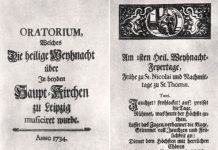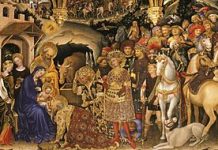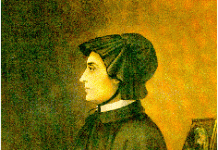On this 13th of June, the universal Church rejoices with the Franciscan order for the feast of one of her famous sons, St Anthony of Padua, the day he was borne into heaven, his dies natalis.
For it was on this day in 1231 that Brother Anthony came down from his tree house to eat the noonday meal with his brothers. They had hardly begun when he collapsed into their arms. As the brothers helped him, he whispered to them that he wished to be taken to Padua so that he might pass away there in peace. Anthony wanted to spend his final hours in the friary with which he deeply fell in love, near the Church of Santa Maria. In order to fulfil his wish, the brothers put him on a cart and travelled toward Padua. Unfortunately Anthony was too weak to make it. When they approached a Poor Clare monastery in Arcella, a town close to Padua, they decided that it would be appropriate to take him there. After he received the Sacrament of the Anointing of the Sick, Anthony intoned the hymn to the Blessed Virgin Mary, O Glorious Queen, exalted above the stars!
The brothers noticed that he was looking intently at something. When they rightly asked him what he was seeing Anthony replied: I see my Lord. He died shortly afterwards at the tender age of 36 years old. His life story immediately portrays to us that he had travelled thousands of kilometres preaching to tens of thousands (if not hundreds of thousands) of people. Although the brothers did all their best to keep Anthony’s death a secret for the fear that his body might be stolen, children immediately noticed that and they were seen running through the streets of Padua shouting: The Saint is dead. Brother Anthony is dead.
Besides his extraordinary preaching activity, St Anthony is also famous when something goes missing. When that havoc occurs all we have to do is invoke him with that childlike faith. The prayer goes: Tony, Tony, come around, something’s lost and can’t be found. And, lo and behold, here comes Tony and with his powerful intercession the item is usually found!
Another interesting fact about St Anthony is that there is a famous exorcism prayer that he himself handed on to an oppressed woman whom the demon literally tormented her during by his temptations. The popularity of this prayer persuaded the Franciscan Pope Sixtus V to engrave it into the base of the obelisk built in St Peter’s Square in Rome. This prayer is also known as the motto of St Anthony. The original Latin text of the prayer is the following: Ecce Crucem Domini! Fugite partes adversae! Vicit Leo de tribu Juda, Radix David! Alleluia! Alleluia! The English translation of the prayer is the following: Behold, the Cross of the Lord! Begone, all evil powers! The Lion of the tribe of Judah, The Root of David, has conquered! Alleluia, Alleluia!
Anthony is the author of numerous sermons, collected as his Sermones. It is wise here to quote what Pope Benedict XVI had to say about them in his beautiful and formative catechesis he imparted on the saint on Wednesday 10 February 2010: In these Sermons St Anthony speaks of prayer as of a loving relationship that impels man to speak gently with the Lord, creating an ineffable joy that sweetly enfolds the soul in prayer. Anthony reminds us that prayer requires an atmosphere of silence, which does not mean distance from external noise but rather is an interior experience that aims to remove the distractions caused by a soul’s anxieties, thereby creating silence in the soul itself. According to this prominent Franciscan Doctor’s teaching, prayer is structured in four indispensable attitudes which in Anthony’s Latin are defined as obsecratio, oratio, postulatio, gratiarum actio. We might translate them in the following manner. The first step in prayer is confidently opening one’s heart to God; this is not merely accepting a word but opening one’s heart to God’s presence. Next, is speaking with him affectionately, seeing him present with oneself; then a very natural thing presenting our needs to him; and lastly, praising and thanking him.
After the Second World War, on January 16, 1946, Pope Pius XII, in his Apostolic Letter Exsulta, Lusitania felix (‘Rejoice, happy Portugal’) ( AAS 38, 1946, 200-204) declared that St Anthony was a Doctor of the Church. He attributed to him the title Doctor Evangelicus. St Anthony’s declaration as Doctor of the Church made much sense within a context where half of Europe was in a state of conquest and desolation, unable to feed many of its impoverished populace and a strong feeling on the part of the victors of the War that the vanquished nations should be impoverished so as never to rise again. This declaration gave a fresh air of hope.
Here are some pieces of great wisdom taken from this authentic disciple of Jesus on the footsteps of our Seraphic Father St Francis.
First, actions persuade what words say. He said: Actions speak louder than words; let your words teach and your actions speak. Second, God is the author of every good. St Anthony cuations us: Attribute to God every good that you have received. If you take credit for something that does not belong to you, you will be guilty of theft. Third, attachment to earthy riches brings a spiritual suicide. He used to preach: Earthly riches are like the reed. Its roots are sunk in the swamp, and its exterior is fair to behold; but inside it is hollow. If a man leans on such a reed, it will snap off and pierce his soul. That is why Anthony presents avarice as the instrument which pulls people into hell when he said: Solicitude for material things distracts the soul and divides it. The devil seizes the divided soul and drags it to hell.
Fifth, the Cross of Christ is the greatest that will take us to our final destination, heaven. Anthony said: Christians must lean on the Cross of Christ just as travelers lean on a staff when they begin a long journey. Sixth, humility brings about the sweetness of the Holy Spirit in the actions we carry out. The Saint of Padua reminds us of this important truth when he teaches us: The spirit of humility is sweeter than honey, and those who nourish themselves with this honey produce sweet fruit. Seventh, by escaping from the minutest scent of lust one can live chastely in Christ. He said: Anyone, then, who desires to live chastely in Christ Jesus, must flee not only the mouse of lust, but even from its very scent.
Eighth, simple people have God’s wisdom in them. It is wise that those who consider themselves powerful and wise listen to them wholeheartedly. Thus, St. Anthony counsels us: The creator of the heavens obeys a carpenter; the God of eternal glory listens to a poor virgin. Has anyone ever witnessed anything comparable to this? Let the philosopher no longer disdain from listening to the common laborer; the wise, to the simple; the educated, to the illiterate; a child of a prince, to a peasant. Ninth, for consecrated people the love for money is their downfall. Anthony says: Damned money! Alas! How many religious did it blind! How many cloistered religious did it deceive! Money is the ‘droppings of birds’ that blinded the eyes of Tobit.
Finally, saints are used by God when he sees it appropriate. The great Franciscan preacher said: The saints are like the stars, who, in His providence, Christ hides under a seal, lest they appear whenever they wish. Instead, they are always ready to disembark from the quiet of contemplation into the works of mercy at the time decided upon by God, whenever their heart should hear the word of command.
This simple, profound and actual teaching of the Doctor Evangelicus leads us to pray to him:
Dear Saint Anthony, I extend my prayer to you, confident in your compassionate goodness, which can listen and console everyone: be my intercessor before the Lord.
You who led an evangelical life, help me to live mine with faith and Christian hope; you who preached the message of charity, inspire the whole of humanity to search for peace and brotherhood; you who supported, even through miracles, the suffering and all those who were facing injustice, please sustain the poor and the forsaken of this world.
Bless especially my work and my family, taking away illnesses of body and soul; make me capable of always remaining close to God, both in times of joy or sorrow, with the faith and the love of a son.
Amen!










